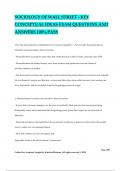Exam (elaborations)
SOCIOLOGY OF WALL STREET - KEY CONCEPTUAL IDEAS EXAM QUESTIONS AND ANSWERS 100% PASS
SOCIOLOGY OF WALL STREET - KEY
CONCEPTUAL IDEAS EXAM QUESTIONS AND
ANSWERS 100% PASS
How has financialization contributed to U.S. income inequality? - 1. Greater financialization in
industries decreases labor's share of income
- Financialization accounts for more than half of the decrease in l...
[Show more]
Preview 3 out of 30 pages
Uploaded on
December 5, 2024
Number of pages
30
Written in
2024/2025
Type
Exam (elaborations)
Contains
Questions & answers
Institution
Wall Street
Course
Wall Street
$13.49
Also available in package deal from $83.99
100% satisfaction guarantee
Immediately available after payment
Both online and in PDF
No strings attached
Also available in package deal (1)
$ 208.33
$ 83.99
17 items
1. Exam (elaborations) - Wall street oasis exam questions and answers 100% pass
2. Exam (elaborations) - Wall street prep real estate technicals exam questions and answers 100% pass
3. Exam (elaborations) - Wall street oasis exam questions and answers 100% pass
4. Exam (elaborations) - Financial markets test 3 (wall street movie questions) questions and answers 100% pas...
5. Exam (elaborations) - Random walk on wall street exam questions and answers 100% pass
6. Exam (elaborations) - Sociology of wall street key concepts exam questions and answers 100% pass
7. Exam (elaborations) - Sociology of wall street - key conceptual ideas exam questions and answers 100% pass
8. Exam (elaborations) - Gcse us history: the wall street crash exam questions and answers 100% pass
9. Exam (elaborations) - Wall street journal quiz #1 with correct answers 100% pass
10. Exam (elaborations) - Wall street final exam review questions and answers 100% pass
11. Exam (elaborations) - Breaking into wall street exam study guide questions and answers
12. Exam (elaborations) - Breaking into wall street" accounting exam questions and answers 100% pass
13. Exam (elaborations) - Wall street 400 q's (non-technical) with correct answers updated 2024/2025
14. Exam (elaborations) - Wall street questions with correct answers 100% pass
15. Exam (elaborations) - A random walk down wall street questions and answers 100% pass
16. Exam (elaborations) - Wall street exam questions and answers 100% pass
17. Exam (elaborations) - Wall street exam practice questions and answers 100% pass
Show more
SOCIOLOGY OF WALL STREET - KEY




